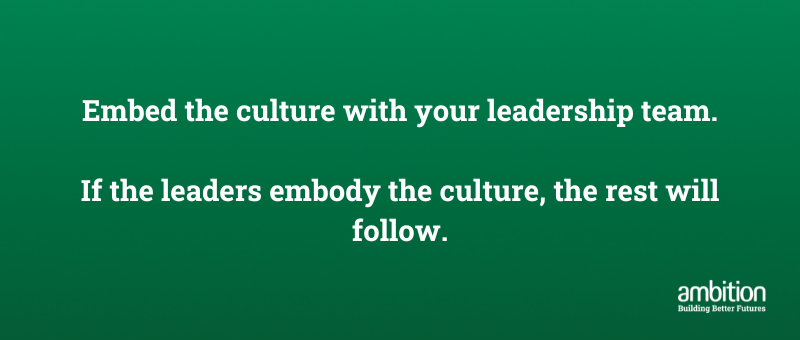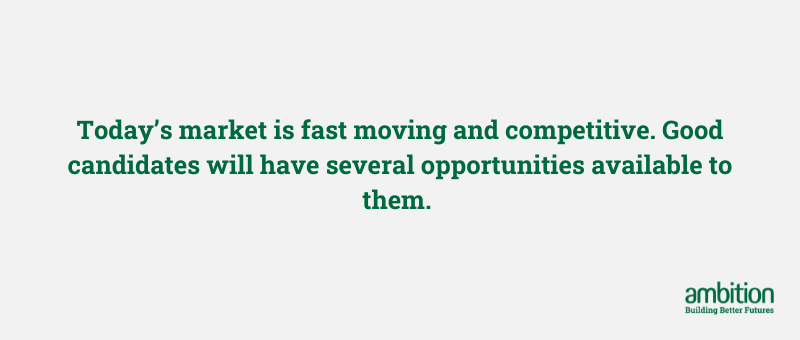Career insights with Ambition podcast
The podcast that dives deep into the defining moments of influential business leaders across technology, accounting and finance.

The podcast that dives deep into the defining moments of influential business leaders across technology, accounting and finance.

The podcast that dives deep into the defining moments of influential business leaders across technology, accounting and finance.

The podcast that dives deep into the defining moments of influential business leaders across technology, accounting and finance.



Creating a culture in today’s remote working environment has left some companies thriving, while others have found their culture falling flat. Many organisations are looking at a full or majority return to the office with “building and maintaining culture” and “improving performance” being the top reasons for this move.
So, how do you build a high-performing culture in today’s remote world?
Firstly, you need to align your company’s goals and vision with your own needs.
There are a few things that high performing teams have in common:
Absolute clarity of purpose
Strong behavioural frameworks
Genuine relationships and communication
To have a high-performing team that works cohesively together, you need to foster an environment where each team member feels they can count on one another and that their work has purpose.
The second part to this question is not every high performing team needs a team full of high performers.
Looking at your team in terms of team dynamics can help here. Good team dynamics can be summarised with these 5 keystones:
The team can take risks without feeling insecure or embarrassed
The ability to count on each other to do high-quality work
Working with clearly defined goals, roles, and execution plans
The work is personally important to everybody on the team
Everybody on the team fundamentally believes that their work matters
Knowing what high performance looks like for your business and agreeing on your method of measurement (output, sales, speed etc.) will help you to identify gaps.
Communication is key. Creating a culture of openness allows your team to engage in real conversations. Encourage your team to show courage: Courage to share what they are thinking and feeling, and courage to listen when others are sharing.
People are at the key of any high-performing team. It’s important for your people to know their personality preferences and take responsibility for how they are going to engage with others to bring out the best in their colleagues as well as themselves.
Individual personalities play a significant role in determining team performance. In particular, personality affects:
What role you have within the team
How you interact with the rest of the team
Whether your values (core beliefs) align with the team’s
By ensuring you have diversity of thought and personality you can create a well-balanced team.
Having a clear definition of what high performance means to you, identifying gaps and hiring or developing into those gaps over time will build the team and culture you want.

The adage “it starts at the top” rings true. You need to embed the culture with your leadership team and if the leaders embody the culture you are looking to build, the rest will follow.
Start by working with your leadership team to compile a list of key attributes that represent the culture you are looking to build. Aim for a minimum of 20. You will start to notice common themes and pillars of what high performance looks like in your organisation.
Some common attributes could be coachability, drive, resilience, accountability, emotional intelligence etc.
Next you will need to work together to whittle that down to 5 or 6. These will become your non-negotiables.
Once you have your non-negotiables, you can build your interview questions and process around these.
By agreeing on these across your leadership team you can hold each other accountable for hiring new employees that embody these attributes.
So now you have your framework of attributes, you know who it is you are looking for and what you need for your team. However, there are a few other considerations to take on board when hiring in the current market.
Your list of attributes should be non-negotiable, however if you are looking for someone who physically doesn’t exist in the current market then you will come unstuck.
Use your recruiter to help establish realistic options based on current market conditions, visa restrictions and legal requirements.
Set out the full process and interview guidelines to candidates from the get-go. If you know there will need to be 5 interviews and a systems test, manage their expectations early on. This will limit the risk of losing them in a competitive job market.
Think about your start date and how quickly you will need someone. A standard notice period is 4 weeks, add on an interview process and you are already staring down the barrel of a 6 week start.
Today’s market is fast moving and competitive. Good candidates will have several opportunities available to them.
Ask yourself, am I willing to lose this person in process? If the answer is no, and this person embodies your non-negotiable attributes, hire them.
With your non-negotiable attributes you can focus on hiring the right behaviours into your team but also look for potential to do the role. By hiring for potential rather than like for like skills, you are more likely to retain this person for longer. Developing them into the role.

As a manager, you need to pave the way for ‘real’ conversations which build high-performing teams. These conversations bring truthfulness, complete trust and openness throughout the team, eliminating politics and games.
When building high-performing teams, it is critical to recognise you will only ever be as good as your weakest link. Accountability must be established for everyone to bring the commitment and the discipline to show the behaviours that align with high performance.
If you would like to discuss this topic further, please contact one of our experts today.
Written by Chris Crolla, Director of Sydney. Chris has been recruiting into finance and accounting since 2011. Now he leads the Sydney teams including accounting support, qualified finance, and technology & transformation. Chris provides unequivocal support, guidance, coaching, and direction. A keen sports fan, and proud husband and father, he’s passionate about building better futures for the leaders of tomorrow.